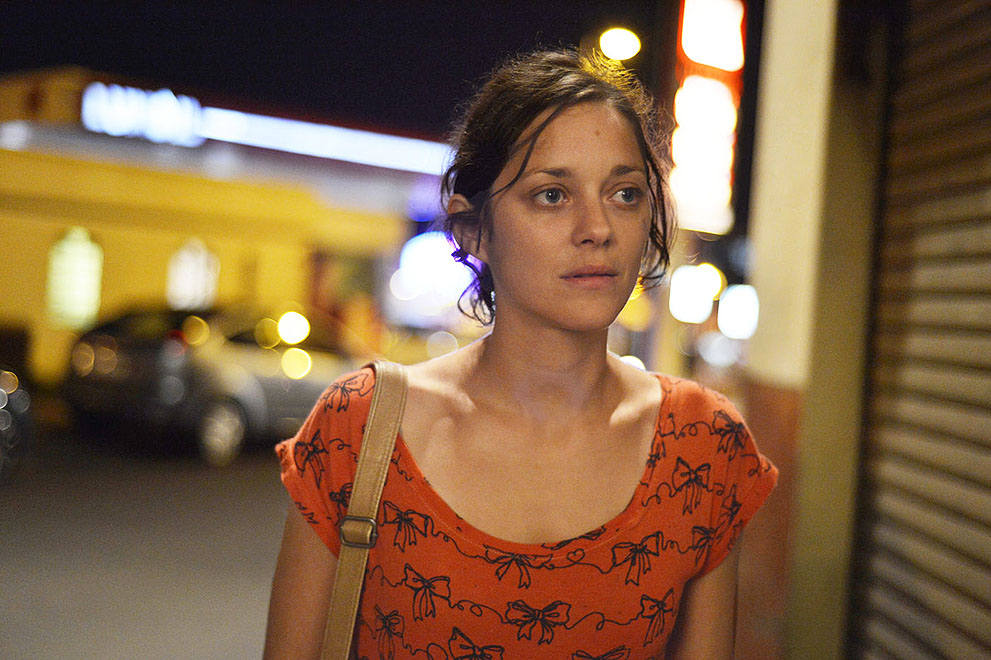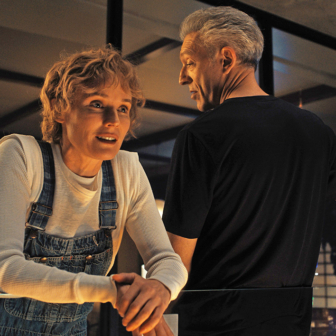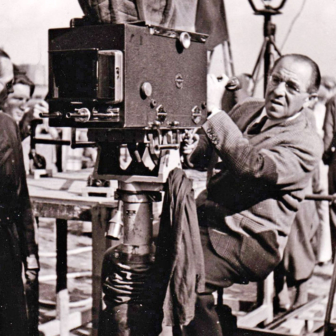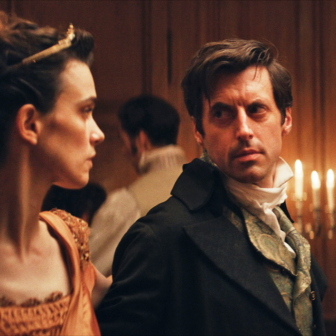In the cinema of the brothers Jean-Pierre and Luc Dardenne, we can read and re-read the story of the European working class under globalised capitalism, without forcing any particular story into a set political shape. Individual lives are tossed around in the currents; solidarity is a faded flag. Union power won’t rescue those made – as they say – surplus to requirements in small-scale manufacturing like that involved in the fictional firm called Solwal in Two Days, One Night. It’s one of the film’s quiet ironies that Solwal’s business is making solar panels – that is, it’s an enterprise notionally on the side of the future, but when it comes to the economic force majeure of labour costs, the workers must deal with an old either/or: more money, smaller staff.
The dilemma at the core of this tale might seem schematic; you could reduce the plot to an ethical fable, a hypothetical: how many of the sixteen staff at Solwal will choose to keep Sandra on the job, as against getting their primes (bonuses) if she’s laid off? All are conflicted; in every family, schooling expenses, food and clothing need two breadwinners – and there are mortgage payments; the perceived alternative is social housing. There’s no time to stop and contemplate that choice; Sandra’s pursuit goes on. Her workmates make their choices; Sandra will emerge from sodden depression only when she can authentically make hers. She recovers; then slides back, dead-eyed – you could get fed up with her; then she plods on again, going the rounds of her workmates through the weekend of the title, seeking their support while trying not to be, as she says, a mendicant. Her husband Manu goes to amazing lengths to keep her on the rails. Sometimes, maybe four times in the course of the story, she smiles; when a Van Morrison song comes through in her friend’s car, there is a revelatory flash, a moment from another life, a space for music and happiness. The film’s final ten minutes are worth analysis: a conclusion in which nothing is concluded, but where politics, ethics and emotions come together in an image of a special, costly kind of freedom.
As ever, the plot is not the film; the hypothetical is transformed by performances; and while Marion Cotillard’s is at the centre, Fabrizio Rongione’s Manu matches it, while the Dardennes’ ways of giving children their places in the milieu intensify our sense of what’s at stake. The film is about them; it’s also about bottled water and tranquillisers, about mobile phones and different ring-tones, about the rush between work, school-gate pickups, getting the beds made and the food on the table, and the way petty, small-scale pressures can surge up into violence.
That grip on daily life has to do with the Dardennes’ insistent localism. All their work, fifty years of it now, is grounded in Wallonia, francophone Belgium; they wouldn’t shift their production operations to Paris, not even to Brussels. The provincial town in the film is Seraing, where they live and work. That integration of life-position and the practice of cinema is exemplary. It provokes an inescapable afterthought: why don’t we do it here, where are the Australian film-makers building films from where we are?
The Turkish director Nuri Bilge Ceylan’s Winter Sleep won the Palme d’Or at Cannes this year, and the major international critics prize as well; then it came in for a last-minute screening at the Sydney Film Festival, when for its whole three hours and sixteen minutes, an overloaded, movie-drunk audience was held spellbound. Every minute of that time, and every square centimetre in the widescreen format, is organised around a Chekhovian drama of provincial life. In the snowbound Cappadocian village, where houses are caverns cut into the rocks, Istanbul is a distant lure, a bit like Moscow in Three Sisters. Some have recalled Ingmar Bergman; we could also invoke Flaubert, or indeed Antonioni, since in this tale it’s the woman, rather than the self-satisfied, culturally ambitious husband, who needs wider horizons and better scope for action.
The film, now on general release, fully repays a second viewing (and strength permitting, I’d be up for a third). Aydin (Haluk Bilginer) was an actor once; now he runs a hotel called Othello, and owns a lot of the village, where people struggle to pay the rent. A sullen nine-year-old flings a stone at Aydin’s truck and shatters a window; the hard-pressed family has to pay up. Ceylan doesn’t underestimate kids; late in the film we find that the child had his reasons. Aydin and his beautiful, much younger wife Nihal (Melisa Sözen) respond very differently to their world, and there’s a strand of comedy in Aydin’s obtuse, misguided attempts to organise her. His tough, jaded sister Necla (Demet Akbag) needles him from the sofa in his study while he tries to produce a newsletter for the community. She is adrift, recently divorced, plainly in need of work to do. They are rich people living among the poor; morally, they flounder. Neither charity nor forced apologies will bridge the gulfs. The deep silences are eloquent; some of those belong to the child, who hasn’t a line of dialogue, but is nevertheless a presence at the centre of the story.
Outside, the snowscapes are vast, and the wild horses of the steppe violently resist being broken in and sold; some might find metaphoric links there with Nihal’s will to freedom, but there are ambiguities in the implied story of the marriage. Something that was once there is lost – you’ve only got to look at Nihal’s eyes as she contemplates the world beyond the window. Inside, firelight plays constantly on the dark, solidly furnished spaces; unnamed women move in and out with tea – and this film is richer for its visible female dimension than Once Upon a Time in Anatolia, marvellous as that film is. Around Winter Sleep, for all the prizes, there is disagreement; one critic found it “a laborious cinematic novel.” In that case, put in the labour, learn to read the language, and gather in the rewards.
The pursuit of cinema takes us away from all our beaten tracks, and none of the nationally or culturally based festivals should be dismissed because of opposition to the policies of the governments that frame them – if only because, as I’ve argued earlier, so many film-makers are working from precarious dissenting positions. The crosscurrents of Middle Eastern politics churn through the programs of the Israeli, Jewish and Palestinian film festivals; all include works that register the large and smaller-scale impacts of conflict and occupation. Following the appearances of Hany Abu-Assad’s Omar, one of the very best films of the year, and Dror Moreh’s tour de force The Gatekeepers, The Green Prince, winner of this year’s grand jury prize at Sundance, and a co-production from German, American and British as well as Israeli sources, will emerge before long on the circuits. This one too, by all accounts, probes betrayal and compromise on both sides of the divide. It was one of more than forty films on the Jewish International Film Festival program, well supported by sponsorship; it played over two weeks in Melbourne and Sydney.
Visiting the festival briefly in Melbourne, I was grateful especially for the chance to look at Write Down, I’m an Arab, a small, powerful essay on the life and work of the major Palestinian poet Mahmoud Darwish (1941–2008). This film was to have been shared with the Palestinian film festival, a modest program that ran over one weekend each in Sydney, Melbourne and Canberra – with no commercial support, relying entirely on volunteers. Something went badly wrong in the negotiations, and in the outcome, the Palestinian program lacked that account of Darwish (whose abundant work, in poetry and prose, is available as If I Were Another in English translation from the Arabic by Fady Joudah). There were other rewards, however. If there’s one film from the Palestinian group that should find a path to wider audiences on large and smaller screens, it’s Mark Kaplan’s The Village Under the Forest, an essay on memory and history, in which the destroyed Palestinian town of Lubya continues to exist in the minds of a population, underneath the woodland built and cultivated to obliterate its remains. To this film, you could bring all the symbolism you like about levels of consciousness; it’s the facts of history that count. •





